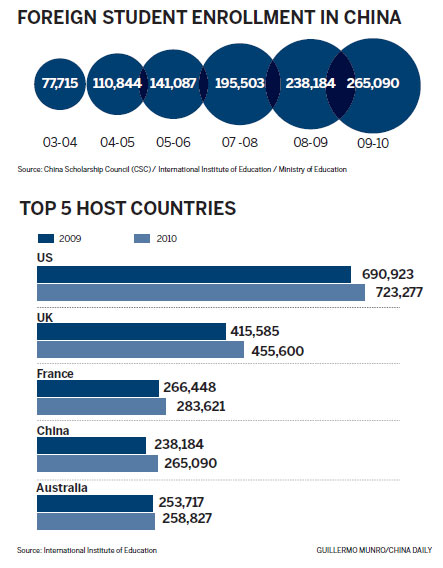Local savvy
Updated: 2012-03-23 08:43
By Todd Balazovic (China Daily)
|
|||||||||||
|
The number of foreign students rose to 40 percent in 2011 at CEIBS. Todd Balazovic / China Daily |
But Cheung-Kong Graduate School of Business (CKGSB) in Beijing, one of the nation's only non-profit business schools due to support from the Li Ka-Shing Foundation, opted not to partner with a Western institution for fear it would limit the function of the degree for students.
"(We) could not rely on a curriculum transplanted from the United States or Europe," says Robert Welch, international marketing and admissions manager for Cheung-Kong's MBA program.
Instead, while developing their MBA they used the Western model as a core, tinkering it to adapt to reflect the emerging global economy and give specific courses on the rise of China, he says.
In addition to constructing courses around China, many of the nation's business school courses focus on Chinese case studies while encouraging foreign students to interact with Chinese peers through extensive group work and semester-long projects.
"Already, CKGSB has developed more than 400 case studies mostly related to Chinese businesses. Each case study took several months of intense research and investigation by a professor and a dedicated research group, which provide students with information they cannot find anywhere else," Welch says.
It was the prospect of learning the China's fast growth markets that first drew 26-year-old Mike Tuan out of a $120,000 (90,700 euros) a year sales and marketing job in the US to pursue his MBA in China.
"Right now, China is being used as a global model and understanding that model is a big advantage," the Tsinghua MBA graduate student says.
The prospect of being able to rub shoulders with China's current and future leaders is perhaps one of the biggest, but unsung, benefits for foreign students studying in China.
When Tuan spoke with China Daily, he had just returned from a trip to Chongqing in Southwestern China where he and several classmates spent a week meeting with top-level executives from multinational companies such as Hewlett-Packard, as well as several local government officials.
By graduating from Tsinghua's partnership program, Tuan says he will be able to associate with both Tsinghua and MIT Sloan's alumni network - a big advantage for someone seeking business opportunities.
"When you are doing an MBA, half of it is networking and you want to make the network where you want to use it. That alone is a good reason to come to China," he says.
In addition to getting access to a degree and an alumni network branded with a top-notch university, many foreign students are drawn to China by the cheaper costs of living and tuition.
For international students at Tsinghua's IMBA program, without food and housing, tuition for the two-year program costs $29,800. If the same student were to fully enroll at MIT Sloan's MBA program in Massachusetts, the cost for tuition alone would be around $50,300. And for students who take advantage of China's cheap food and housing outside the classroom, the savings are even greater.
This means foreign students studying in China can almost halve their MBA tuition costs without having to sacrifice their brand name.
Sparking the growth in Chinese business schools has been the whirlwind of multinationals expanding operations to China over the past 10 years as foreign companies rush to get a grip on the next big consumer market. China's foreign direct investment in 2011 totaled $116 billion, and that number is only set to go up as foreign companies see growth back home slow due to economic problems.
"Because of the increasing importance of China and the growth that it represents in overall corporate performance among many multinationals, they no longer rely on growth coming from the developed markets," Quelch of CEIBS says.
 |
And as more State-owned companies go public and more multinationals enter China, the need for Western brains to solve Chinese problems, and vice versa, is expanding. That means more effort from Chinese students looking to earn degrees at Western institutions and more Western students looking to learn about China.
Currently, Chinese students make up the largest foreign nationality studying in American universities. But the US is not far behind with China listing as the fifth most popular destination for US students.
With more than 260,000 foreign students, China is the fourth leading destination worldwide for students studying abroad full time, behind France, the UK, and the United States, according to the International Institute of Education's (IIE) 2012 Project Atlas report. About 30 percent of those students are pursuing MBA and EMBA degrees.
Those numbers are set to rise as efforts by the Chinese government to attract foreign students start to show results. With more than 800 million yuan going toward scholarships for international students in 2010, housing incentives and a jump in accredited schools - the China option is becoming increasingly attractive.
"China has been very strategic in providing financial incentives and information to attract more students," says Peggy Blumenthal, senior counselor to the President for IIE, a US-based NGO that promotes international education exchange.
Blumenthal says over the past years she has noticed large efforts by Chinese organizations to recruit students from the US with the China Scholarship Council, a China-based NGO which helps fund foreign students wishing to study in China, hosting its first China-focused recruitment fair in the US last year.
Attracting students is not only valuable for China in terms of helping the world comprehend the often-misunderstood rising superpower, it is also profitable.
In the US, where education draws more than 700,000 international students a year, tuition fees brought into the country by foreign students accounts for $13 billion in the US economy.
While the benefits of studying in one of the world's fastest growing economies may be numerous, the opportunities for foreign MBA graduates to work in China are not always as plentiful as China's swelling market may suggest.
Despite a critical need to fill a gap in the managerial class six years ago - in 2006 McKinsey & Co estimated that China would need more than 75,000 top-level executives by 2010 - tens of thousands of Chinese students took up the call, enrolling overseas and returning home to fill those positions.
The result is that many companies, both foreign and domestic, prefer to hire Chinese graduates who have studied abroad and earned international experience when looking to expand operations, says Ben Leary, CEO of Column Associates, a Beijing-based talent management agency.
"It's difficult to learn the intricacies of China's business culture just by studying in the country for two years. It's almost impossible."
On the other hand, Chinese students studying abroad are able to grasp Western business concepts quickly and apply them to the Chinese way of doing business, he says.
In addition to having larger access to a pool of Chinese talent, a majority of positions being offered for foreign managers are senior, meaning that fresh graduates do not have the experience requirements to hold the available jobs.
This is the problem recent CEIBS graduate Eric Seidner is confronting.
The 31-year-old American first came to China during its economic upswing seven years ago.
He says that when it comes to applying for jobs at both multinational and domestic companies, language barrier and Chinese human resources practices often give Chinese applicants the upper hand.
Despite several years experience doing business in China and speaking nearly fluent Chinese, competition is still tough, he says.
"Those who have the biggest advantage from what I've been seeing are the ones who have gone abroad and studied and returned - they have the international experience, the exposure to Western education and are still fluent in the language and culture," he says.
But, just as Chinese graduates who return to China after studying in the West have an advantage, foreign professionals who return home after studying in China have a unique edge.
For James Osterloh, who has enrolled in the two-year MBA program at CEIBS, choosing to go China was a way to distinguish himself in his pre-existing job as project manager at Standard Bank in South Africa.
"What this really does is differentiate you. Going forward I will be able to compete better with my peers in the bank by using the China expertise," Osterloh says.
When the 31-year-old South African told his company he wanted to pursue an MBA in China, he received full support, with the bank even offering to help pay for a portion of his education.
The former British army captain says after he finishes his degree, he will return to the bank to play a bigger role in helping develop ties between China and Africa, a position his previous education and experience would have never allowed him to do.
Contact the writer at toddbalazovic@chinadaily.com.cn
Today's Top News
Rescuers race against time for quake victims
Telecom workers restore links
Coal mine blast kills 18 in Jilin
Intl scholarship puts China on the map
More bird flu patients discharged
Gold loses sheen, but still a safe bet
US 'turns blind eye to human rights'
Telecom workers restore links
Hot Topics
Lunar probe , China growth forecasts, Emission rules get tougher, China seen through 'colored lens', International board,
Editor's Picks

|

|

|

|

|

|






